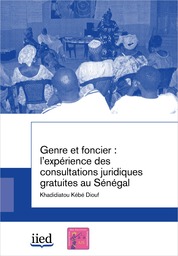Focal point
Location
Mission
Our mission is to build a fairer, more sustainable world, using evidence, action and influence in partnership with others.
Who we are
IIED is one of the world’s most influential international development and environment policy research organisations. Founded in 1971 by economist Barbara Ward, who forged the concept and cause of sustainable development, we work with partners on five continents. We build bridges between policy and practice, rich and poor communities, the government and private sector, and across diverse interest groups. We contribute to many international policy processes and frameworks, including the Intergovernmental Panel on Climate Change, the Millennium Ecosystem Assessment and the UN conventions on climate change and biological diversity.
What we do
IIED carries out research, advice and advocacy work. We carry out action research — generating robust evidence and know-how that is informed by a practical perspective acquired through hands-on research with grassroots partners — and we publish in journals and maintain high research standards. We advise government, business and development agencies, and we argue for changes in public policy. We focus on bottom-up solutions, stay open to flexible, adaptable solutions and are marked by a tradition of challenging conventional wisdom through original thinking.
Resources
Displaying 146 - 150 of 367Mainstreaming gender in Tanzania’s local land governance
Despite progressive provisions on gender equality in Tanzania’s land laws, women have little representation in land allocation decisions. Mainstreaming gender in local regulations can help address this problem. The Tanzania Women Lawyers Association, in partnership with the World Resources Institute and Lawyers’ Environmental Action Team, developed model by-laws to improve women’s participation in local-level decision-making on village land management. This took place in Kidugalo and Vilabwa villages in Kisarawe district.
Genre et foncier : l’expérience des consultations juridiques gratuites au Sénégal
Land investments, accountability and the law: Lessons from West Africa
The recent wave of land deals for agribusiness investments has highlighted the widespread demand for greater accountability in the governance of land and investment. Legal frameworks influence opportunities for accountability, and recourse to law has featured prominently in grassroots responses to the land deals. Drawing on comparative socio-legal research in Cameroon, Ghana and Senegal, this report explores how the law enables, or constrains, accountability in investment processes.
When investors come knocking: ensuring African women have a say
In much of sub-Saharan Africa, women have little say in decisions over land. Unless proactive steps are taken to enable women to have a stronger voice, large-scale agribusiness projects will leave them even more marginalised. Though there has been little research in this area, an emerging body of thinking and practice provides clear pointers as to how governments, NGOs and investors might mitigate such risks in future, particularly by explicitly addressing gender issues head-on from the very outset.
Commodity cycles, economic treaties and pressures on land rights
Contains ‘land grabbing’ starts at home; the commodity slide; the land footprint of international economic treaties. Argues that systemic action is needed to strengthen local land rights and voices in land governance.





